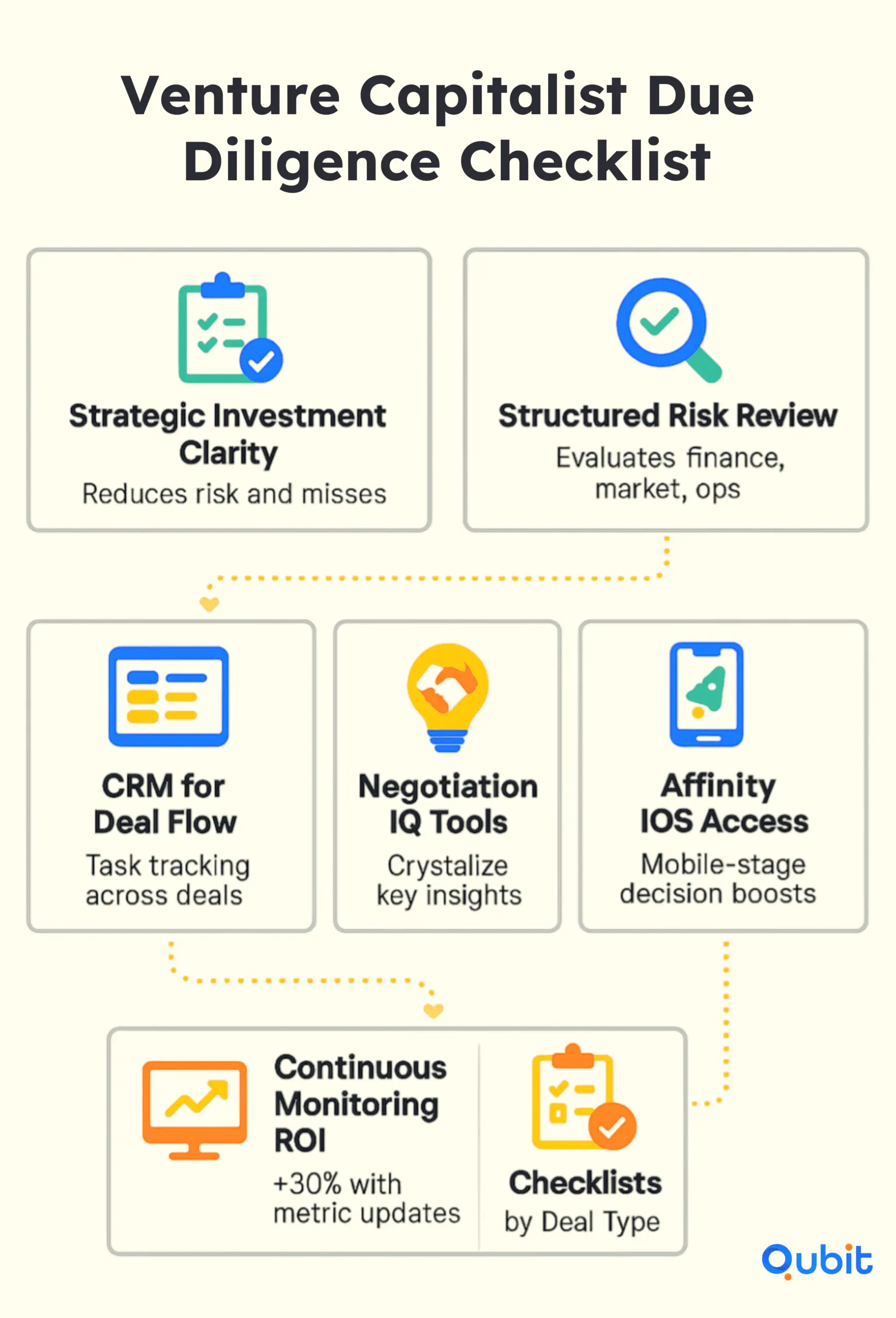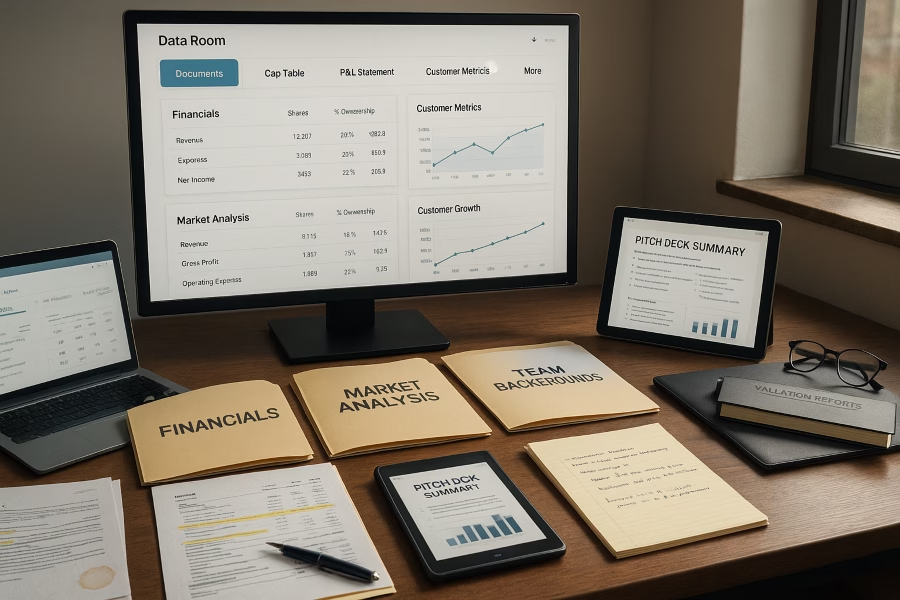Venture capitalists (VCs) carefully evaluate startups using a structured due diligence process. They often use tools like VC CRM platforms to make evaluations more efficient. This checklist helps VCs make informed decisions, reducing risks and identifying promising investments.
Startup fundraising strategies provide a broader perspective by placing the detailed due diligence checklist within the larger context of raising capital, from seed rounds to Series C. Understanding what VCs evaluate can empower startups to prepare effectively, ensuring they meet the rigorous standards of investors.
Let’s explore the key components of VC due diligence and how startups can position themselves for success.
What Makes VC Due Diligence Unique?
Venture capital (VC) due diligence is unique because of its detailed, multi-layered approach. Unlike traditional investment evaluations, VC firms thoroughly assess risks, opportunities, and operational dynamics. They often spend at least 20 hours per deal to ensure a comprehensive review. This significant time investment reflects the complexity of evaluating startups, where factors like scalability, market fit, and team resilience are crucial.
One emerging trend reshaping VC due diligence is the growing emphasis on cybersecurity audits. By 2026, 60% of VCs will require cybersecurity audits as part of their evaluation process. This shift highlights the increasing importance of safeguarding sensitive data and ensuring startups meet robust security standards. Cybersecurity risks can greatly affect a startup’s valuation and long-term viability, making these audits a critical part of modern due diligence.
Technology is also transforming how VCs approach due diligence. AI-powered automation, for instance, is streamlining the traditionally manual evaluation process. By integrating machine learning for data pattern recognition, VCs can reduce evaluation time by 40-60% while improving accuracy. This innovation not only accelerates decision-making but also enhances the depth of insights, enabling firms to identify potential risks and opportunities more effectively.
What Screening Criteria Do Major VC Firms Use in Their Due Diligence Process?
Efficient screening is the backbone of successful venture capital investments. Deal teams often rely on clear pass/fail criteria to quickly filter opportunities that align with their investment strategy. These criteria focus on four key areas: company stage, geographic presence, financial profiles, and industry specialization.
- Company Stage
- Geographic Presence
- Financial Profiles
- Industry Specialization
- Team and Founders (experience, track record, cohesion)
- Market Potential and Traction (customer growth, revenue momentum, retention rates)
- Technology, Intellectual Property & Regulatory Alignment (proprietary tech, patents, compliance)
1. Company Stage
The stage of a company determines its readiness for VC funding. Early-stage startups may require seed funding, while growth-stage companies often seek Series A or beyond. Screening questions like “Is the company generating revenue?” or “Does it have a scalable business model?” help assess its maturity and potential.
2. Geographic Presence
Geography plays a crucial role in investment decisions. Many VC firms prefer startups within specific regions to ensure proximity for mentorship and operational support. For example, a firm might ask, “Is the company located within our target investment regions?” to streamline deal flow.
3. Financial Profiles
Financial stability is a non-negotiable factor. Screening questions such as “Does the startup have a clear path to profitability?” or “Are its financial projections realistic?” help evaluate its viability. According to recent data, 49% of investors use 4–6 data sources per deal evaluation, underscoring the importance of cross-referencing financial metrics.
4. Industry Specialization
VC firms often focus on industries where they have expertise. Screening questions like “Does the startup operate within our preferred sectors?” ensure alignment with the firm’s strategic goals. Strong deal sourcing channels, as highlighted in this resource, further refine industry-specific opportunities.
Build a Strong Framework for VC Due Diligence
A comprehensive due diligence checklist is the cornerstone of effective venture capital evaluation. By standardizing the process, investors can ensure consistent and thorough reviews across all critical operational domains.
This framework typically spans five essential areas: financial, legal, HR, IT, and marketing. Each domain is carefully examined to uncover potential risks and opportunities. For example, financial assessments verify the accuracy of revenue projections and cash flow statements, while legal reviews identify compliance issues or intellectual property concerns. HR evaluations focus on team dynamics and organizational structure, IT audits assess technological scalability, and marketing analyses gauge customer acquisition strategies and brand positioning.
Using a standardized checklist not only streamlines the evaluation process but also minimizes the risk of overlooking vital details. Professional investors often reference established VC Checklists to ensure their framework aligns with industry best practices. These checklists provide detailed examples of categories commonly reviewed during due diligence, offering a reliable guide for structuring evaluations.
Additionally, aligning due diligence with broader capital strategies can enhance decision-making. For instance, an examination of ways to secure capital for startup sheds light on how thorough evaluations support funding decisions tailored to different growth stages.
By adopting a robust checklist, venture capitalists can systematically assess startups, ensuring no critical aspect is overlooked while maintaining consistency across investments.
Your Complete VC Due Diligence Checklist Template
A comprehensive due diligence checklist is essential for evaluating every operational aspect of a startup. This template organizes the process into distinct categories, ensuring no critical detail is overlooked.
Financials
Start by assessing the startup’s financial health. Review accurate bookkeeping practices, as they form the foundation of financial due diligence. Dive into income statements for insights into operational profitability, and examine cap tables to ensure ownership transparency. Additionally, a financial due diligence checklist can help identify revenue or expense anomalies. For deeper insights, explore financial due diligence and income statements resources.
Legal
Verify compliance with local and international regulations. Scrutinize contracts, intellectual property rights, and any pending legal disputes. This step is crucial for safeguarding the startup’s valuation during fundraising, as highlighted in value protection.
Human Resources
Evaluate the team structure, employment agreements, and compensation plans. A strong HR foundation ensures operational stability and supports long-term growth.
Assets and IT
Assess physical and digital assets, including proprietary technologies and IT infrastructure. Confirm that systems are scalable and secure, minimizing risks tied to data breaches or operational inefficiencies.
Products/Services
Analyze the startup’s offerings for market fit, scalability, and innovation. This category often dictates the depth of diligence required, especially during the Series A stage.
Marketing and Competition
Examine marketing strategies and key metrics like LTV and CAC, which play a pivotal role in a VC’s decision-making process. Additionally, evaluate competitors to understand market positioning. Learn more about key metrics that influence investment decisions.
Founder Background
Finally, assess the founders’ experience, vision, and leadership capabilities. Their track record often predicts the startup’s potential for success.
This checklist template not only mitigates typical fundraising challenges and solutions but also ensures a thorough evaluation across all critical categories.
How a Due Diligence Checklist Can Strengthen Your Investment Deals

A well-structured due diligence checklist is more than a tool—it’s a strategic advantage. By systematically addressing critical areas, investors can ensure no essential details are missed, ultimately securing stronger investment outcomes. Whether evaluating financial health, market potential, or operational risks, a checklist provides clarity and consistency, reducing uncertainties during deal negotiations.
Modern tools amplify the efficiency of this process. For instance, a robust CRM platform enables venture capitalists to track tasks across multiple deals simultaneously, ensuring seamless management of contacts, pipelines, and relationships. Additionally, Relationship IQ tools clarify essential points during negotiations, fostering deeper insights and stronger connections with stakeholders.
Integrating technology into pre-diligence workflows also positions startups for better deal outcomes. Mobile access to data, such as through the Affinity iOS app, accelerates decision-making during the final stages of diligence, ensuring timely and informed choices. Furthermore, periodic re-checking of metrics post-investment, known as Continuous Due Diligence Monitoring, has been shown to yield up to 30% higher ROI.
For investors exploring diverse funding structures, understanding startup funding options like equity and debt can complement the checklist approach, tailoring evaluations to specific deal types.
By combining a comprehensive checklist with advanced tools, investors can streamline workflows, enhance transparency, and make confident decisions that drive long-term success.
How Kruze Consulting Supports Your VC Due Diligence Needs
Preparing for venture capital due diligence can be a daunting task for startups, but Kruze Consulting simplifies the process with tailored expertise. As a trusted partner for VC-backed companies, Kruze specializes in assembling comprehensive financial documentation and ensuring startups are investor-ready.
Their team focuses on streamlining financial preparations, helping startups compile essential materials such as audited financial statements, tax filings, and detailed forecasts. This meticulous approach not only saves time but also enhances the credibility of startups during the due diligence phase.
Sema Technologies transformed its financial operations by collaborating with Kruze Consulting, a firm renowned for its expertise in startup accounting and financial modeling. This partnership proved instrumental in helping Sema Technologies meet the stringent expectations of top-tier venture capitalists.
Kruze Consulting streamlined Sema’s accounting processes, ensuring compliance and accuracy in financial reporting. Additionally, their tailored financial modeling provided Sema with actionable insights, enabling the company to align its strategies with the demands of world-class venture capitalists. This alignment not only enhanced investor confidence but also positioned Sema Technologies for sustainable growth.
The collaboration underscored the importance of specialized financial services for startups aiming to scale effectively. By addressing key financial challenges, Kruze Consulting empowered Sema Technologies to focus on innovation and expansion, ultimately achieving remarkable financial success.
Why Kruze Consulting’s Financial Solutions Are Trusted by Startups
Kruze Consulting sits at the center of many VC deals because it solves the biggest founder headache: producing flawless, investor-ready financials. Its 150-plus specialists organize every statement and KPI into a digital data room, so when investors request information, founders can share it in minutes—not weeks—without scrambling or risking valuation knocks. Beyond basic bookkeeping, the team reviews forecasts, pinpoints red flags before diligence starts, and delivers strategic advice tailored to fast-growing startups.
That combination of deep bench strength and startup-specific workflows builds credibility with venture funds, letting founders keep their attention on hitting growth targets. It also unlocks hidden value—Cinder Technologies, for instance, captured sizeable R&D tax-credit savings after Kruze’s review uncovered overlooked claims.
In short, Kruze’s end-to-end support—document prep, diligence coaching, granular analysis, and compliance guidance—removes friction from fundraising and gives startups the financial polish investors expect, while preserving the speed and flexibility young companies need.
Conclusion
A comprehensive due diligence checklist is essential for startups aiming to secure funding while minimizing risks. By incorporating innovative technology tools and collaborating with expert partners like Kruze Consulting, startups can streamline their processes and ensure accuracy in their financial and operational evaluations. This structured approach not only reduces potential pitfalls but also positions businesses for long-term success in the competitive funding landscape.
If you’re looking to streamline your investment process post due diligence, we at Qubit Capital can help with our Investor Outreach service.
Key Takeaways
• A thorough due diligence checklist is vital for reducing VC investment risks.
• VC due diligence must cover multiple layers—financials, legal, HR, and cybersecurity.
• Clear screening criteria and integrated technology speed up evaluation.
• Case studies show how expert due diligence delivers measurable benefits.
• Kruze Consulting’s specialized services help startups prepare investor-ready financials.
Frequently asked Questions
What does VC due diligence include?
VC due diligence involves a comprehensive examination of a startup’s financial records, legal frameworks, human resource policies, cybersecurity measures, product feasibility, market positioning, and the founders’ backgrounds to identify and address potential risks before investment.






